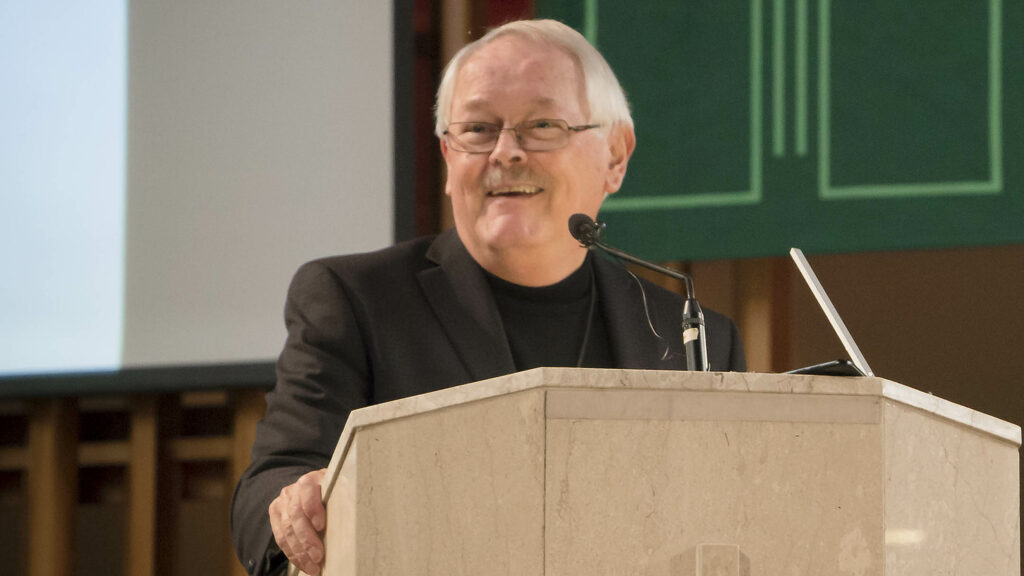Imagine this: A man, entirely careless of all moral and spiritual affairs, lives his life in utter selfishness, pleasure his only pursuit. He lives the high life, never prays, never goes to church, has numerous sexual affairs, and has no concern for anyone but himself.
After a long life of this, he’s diagnosed with a terminal illness and, on his deathbed, tearfully repents, makes a sincere confession, receives the Eucharist, and dies inside the blessing of the church and his friends.
Now, if our reaction is, “Well, the lucky fellow! He got to live a life of selfish pleasure and still gets to go to heaven!”, then (according to Piet Fransen, a renowned theologian on Grace) we haven’t yet, at all, understood the workings of grace. To the degree that we still envy the amoral and wish to exclude them from God’s grace, even as we count ourselves in, we are the “Older Brother” of the Prodigal Son, standing outside the Father’s house, heaven, in envy and bitterness.
I teach in a seminary that prepares seminarians for ordination. Recently our professor of Sacramental Theology shared this: He’s been teaching a course on the Sacrament of Reconciliation for more than forty years and only in the last few years have the seminarians asked: “When do we have to refuse giving someone absolution in confession?”
What’s betrayed in this concern? The seminarians asking the question are, no doubt, sincere; they’re not trying to be rigid or hard. Their anxiety is rather about grace and mercy. They’re sincerely anxious about perhaps dispensing God’s mercy too liberally, too cheaply, too indiscriminately, in essence, too unfairly. Their fear is not so much that God’s mercy is limited and that there’s only so much grace to go around. Not that. Their concern is more that by giving out grace so liberally they’re being unfair to those who are practicing faithfully and bearing the heat of the day. Their fear is about fairness, justice, and merit.
What’s at stake here? That grace is not something we merit. After the Rich Young Man in the Gospels turns down Jesus’ invitation to leave everything and follow him, Peter, who watched this encounter and who, unlike the rich young man, hasn’t turned down Jesus’ invitation and has given up everything to follow him, asks Jesus what those who do give up everything are going to get in return.
In response, Jesus tells him the parable of the generous land owner and the vineyard workers who all arrive at different times, wherein some work for many hours and some for virtually no time at all, and yet they all receive the same reward, leaving those who worked the full day and bore the heat of the sun bitter with sense of unfairness. But, the vineyard owner (God) points out that there’s no unfairness here since everyone has in fact received an over-generous return.
What’s the deep lesson? Whenever we’re protesting that it isn’t fair that those who aren’t as faithful as we but are still receiving the full mercy and grace of God we are some distance from understanding grace and living fully inside it.
My dental hygienist knows I’m a Catholic priest and likes to ask me questions about religion and church. One day she shared this story: Her mother and father had both, as far as she knew, never attended church. They’d been benign enough about religion, but not interested themselves. She, their daughter, had begun practising as a Methodist, mainly through the influence of friends.
Then her mother died and as they talked about plans for a funeral, her father revealed that her mother had been baptized as a Roman Catholic, though she had not practiced since her middle-school years. He suggested they try to arrange a Roman Catholic funeral for her. Given all those years of absence, it was with some trepidation that they approached a priest at a nearby parish to ask whether they might have a Roman Catholic funeral for her.
To their surprise, the priest’s response was non-hesitant, warm, and welcoming: “Of course, we can do this! It will be an honour! And I’ll arrange for a choir and a reception in the parish hall afterwards.”
No price was exacted for her mother’s life-long absence from the church. She was buried with the full rites of the Church … and her father, well, he was so touched by it all, the generosity of the church and the beauty of the liturgy, that he has since decided to become a Roman Catholic.
One wonders what the effect would have been had the priest refused that funeral, asking how they could justify a church funeral when, for all these years, they weren’t interested in the church. One wonders too how many people find this story comforting rather than discomforting, given a strong ecclesial ethos today wherein many of us nurse the fear that we are handing out grace and mercy too cheaply.
But grace and mercy are never given out cheaply since love is never merited.

